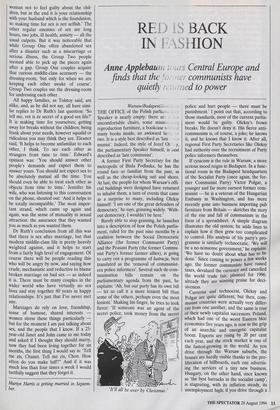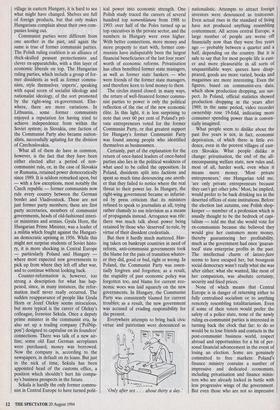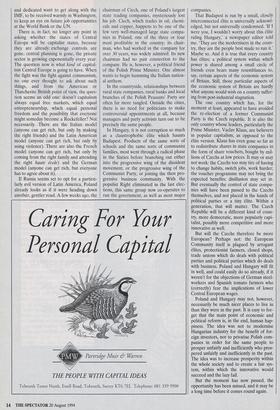RED IS BACK IN FASHION
Anne Applebautt. I, Central Europe and
finds that the communists have quietly f led to power
Warsavaudapestl,. THE OFFICE of the Polish parlia,1 Speaker is nearly empty: there ar uncomfortable chairs, some mism reproduction furniture, a bookcase N. many books inside, an awkward la two. It is a style best described as 'late - munist'. Indeed, the style of Jozef 01 y, the parliamentary Speaker himself, is uest described as 'late communist'.
A former First Party Secretary for the metropolis of Biala Podlaska, he has the round face so familiar from the past, as well as the cheap-looking suit and shoes. At last, the people for whom Warsaw's offi- cial buildings were designed have returned to inhabit them, a turn of events that came as a surprise to many, including Oleksy himself. 'I am one of the great defenders of democracy,' he says, grinning widely. 'With- out democracy, I wouldn't be here.'
Barely able to stop grinning, he launches into a description of how the Polish parlia- ment, ruled for the past nine months by a coalition between the Social Democratic Alliance (the former Communist Party) and the Peasant Party (the former Commu- nist Party's former farmer allies), is going to carry out a programme of luslracja, best translated as the 'removal of communist- era police informers'. Several such de-com- munisation bills remain on the parliamentary agenda from the past, he explains: ',Ah, but our party has its own bill — let us call it a more lenient bill than some of the others, perhaps even the most lenient.' Shaking his finger, he tries to look fierce: 'If someone was an agent of the secret police, took money from the secret `It'll all be over by Christmas.' police and hurt people. — there must be punishment.' I point out that, according to those standards, most of the current parlia- ment would be guilty. Oleksy's frown breaks. He doesn't deny it. His fierce anti- communism is, of course, a joke; he knows it, and he knows that I know it. After all, regional First Party Secretaries like Oleksy had authority over the recruitment of Party police informers themselves.
If cynicism is the rule in Warsaw, a more serious mood reigns in Budapest. In a func- tional room in the Budapest headquarters of the Socialist Party (once again, the for- mer Communist Party) Victor Polgar, a younger and far more earnest former com- munist — he is a veteran of the Hungarian Embassy in Washington, and has more recently gone into business importing pub furniture from Britain — sketches the story of the rise and fall of communism in the form of a spreadsheet. A simple diagram illustrates the old system; he adds lines to explain how it then grew too complicated to control. His analysis of his party's pro- gramme is similarly technocratic. 'We will be a no-nonsense government,' he explains. `We have no doubt about what has to be done.' Since coming to power a few weeks ago, the former communists have raised taxes, devalued the currency and cancelled the world trade fair, planned for 1996: already they are winning praise for deci- siveness.
Careerist and technocrat, Oleksy and Polgar are quite different, but then, com- munist countries were actually very differ- ent from one another, and the same is true of their newly capitalist successors. Poland, which had one of the worst Eastern bloc economies five years ago, is now in the grip of an anarchic and energetic capitalist boom. Exports are rising by 20 per cent each year, and the stock market is one of the fastest-growing in the world. As you drive through the Warsaw suburbs, the houses are hardly visible thanks to the pro- liferation of billboards, each one advertis- ing the services of a tiny new business. Hungary, on the other hand, once known as 'the best barracks in the socialist camp', is stagnating, with its inflation steady, its unemployment high; if you drive through a village in eastern Hungary, it is hard to see what might have changed. Shelves are full of foreign products, but that only makes Hungarians complain about their own com- panies losing out.
Communist parties were different from one another in the past, and again the same is true of former communist parties. The Polish ruling coalition is an alliance of thick-skulled peasant protectionists and clever ex-apparatchiks, with a thin layer of economic liberals on top. The Hungarian ruling parties, which include a group of for- mer dissidents as well as former commu- nists, style themselves 'experts', speaking with equal scorn of socialist ideology and nationalist ideology, of the sort promoted by the right-wing ex-government, Else- where, there are more variations. In Lithuania, some former communists enjoyed a reputation for having tried to achieve independence from within the Soviet system; in Slovakia, one faction of the Communist Party also became nation- alists, successfully agitating for the division of Czechoslovakia.
What all of them do have in common, however, is the fact that they have been either elected after a period of non- communist rule, or, in the case of Slovakia or Rumania, retained power democratically since 1989. It is seldom remarked upon, but — with a few exceptions, most notably the Czech republic — former communists now rule every country between the German border and Vladivostock. These are not just former party members; these are first party secretaries, members of communist governments, heads of old-fashioned interi- or ministries and armies. Gyula Horn, the Hungarian Prime Minister, was a leader of a militia which fought against the Hungari- an democratic uprising in 1956. While this might not surprise students of Soviet histo- ry, it is more shocking in Central Europe — particularly Poland and Hungary where most expected new governments to pick up from where they left off after war, and to continue without looking back.
Counter-reformation is, however, too strong a description for what has hap- pened, since, in many instances, the refor- mation itself never really occurred. The sudden reappearance of people like Gyula Horn or Jozef Oleksy seems miraculous, but more typical is the career of Oleksy's colleague, Ireneusz Sekula. Once a deputy prime minister in the communist era, he also set up a trading company (`PolNip- pon') designed to capitalise on its founders' connections. There was talk of a new air- line; some old East German aeroplanes were purchased; money was borrowed. Now the company is, according to the newspapers, in default on its loans. But just in the nick of time, Sekula has been appointed head of the customs office, a position which shouldn't hurt his compa- ny's business prospects in the future.
Sekula is hardly the only former commu- nist in Central Europe to have turned polit- ical power into economic strength. One Polish study traced the careers of several hundred top nomenklatura from 1988 to 1993: over half of the Poles turned up as top executives in the private sector, and the numbers in Hungary were even higher. With better connections, more money and more property to start with, former com- munists have indisputably been the largest financial beneficiaries of the last four years' worth of economic reforms. Privatisation has often benefited former state managers, as well as former state bankers — who were friends of the former state managers, and therefore keen to lend money to them.
The circles stayed closed: in many ways, the return of well-financed former commu- nist parties to power is only the political reflection of the rise of the new economic elite. In this light, it is less surprising to note that over 60 per cent of Poland's pri- vate entrepreneurs voted for the former Communist Party, or that greatest support for Hungary's former Communist Party was found among people who identified themselves as businessmen.
Certainly, part of the explanation for the return of once-hated leaders of once-hated parties also lies in the political weakness of what used to be called the opposition. In Poland, dissidents split into factions and spent so much time denouncing one anoth- er that they failed to notice where the real threat to their power lay. In Hungary, the right-wing government became so infuriat- ed by press criticism that its ministers refused to speak to journalists at all, trying rather clumsily to use television as a means of propaganda instead. Arrogance was rife: there was much talk about power being retained by those who 'deserved' to 'rule, by virtue of their dissident credentials.
But then it hardly much mattered. Hav- ing taken on bankrupt countries in need of reform, anti-communist governments took the blame for the pain of transition whatev- er they did, good or bad, right or wrong. In Poland, the Communist Party was essen- tially forgiven and forgotten; as a result, the stupidity of past economic policy was forgotten too, and blame for current eco- nomic woes was laid squarely on the new governments. In Hungary, the Communist Party was consistently blamed for current troubles; as a result, the new government was accused of evading responsibility for the present.
Everywhere attempts to bring back civic virtue and patriotism were denounced as `Only after sex . . . about thirty a day.' nationalistic. Attempts to attract foreign investors were denounced as traitorous. Even actual rises in the standard of living have not produced anything resembling contentment. All across central Europe, a large number of people are worse off financially now than they were five years ago — probably between a quarter and a half, depending on the country. But it is safe to say that for most people life is easi- er and more pleasurable in all sorts of unquantifiable ways: queues have disap- peared, goods are more varied, books and magazines are more interesting. Even the figures, based on communist-era data, which show production dropping, are sus- pect. In Poland, official statistics showed production dropping in the years after 1989; in the same period, video recorder ownership rose 19-fold, indicating more consumer spending power than is conven- tially imagined.
What people seem to dislike about the past five years is not, in fact, economic deprivation, of which there is little evi- dence, even in the poorest villages of east- ern Slovakia. What people dislike is change: privatisation, the end of the all- encompassing welfare state, new rules and, most of all, harder work, even when it means more money. 'Most private entrepreneurs,' one Hungarian told me, `are only private entrepreneurs because they can't get other jobs! Most, he implied, would prefer to be back drinking tea in the deserted offices of state institutions. Before the election last autumn, one Polish shop- keeper — member of a profession which is usually thought to be the bedrock of capi- talism — told me that she would vote for ex-communists because she believed they would give her customers more money, thereby guaranteeing her profitability, much as the government had once 'guaran- teed' state enterprise profits in the past. The intellectual charm of laissez-faire seems to have escaped her, but bourgeois social democracy wasn't really what she was after either: what she wanted, like most of her compatriots, was absolute certainty, security and fixed prices.
None of which means that Central Europe is in danger of returning either to fully centralised socialism or to anything remotely resembling totalitarianism. Even if some of their voters would prefer the safety of a police state, none of the newly ruling ex-communist parties is interested in turning back the clock that far: to do so would be to lose friends and contacts in the post-communist business world, respect abroad and opportunities for a bit of per- sonal financial advancement in the event of losing an election. Some are genuinely committed to free markets: Poland's finance ministry contains a number of impressive and dedicated economists, including privatisation and finance minis- ters who are already locked in battle with less progressive wings of the government. But even those who are not so impressive and dedicated want to get along with the IMF, to be received warmly in Washington, to keep an eye on future job opportunities at the World Bank or the UN.
There is, in fact, no longer any point in asking whether the states of Central Europe will be capitalist states, because they are already: exchange controls are gone, central planning is gone, the private sector is growing exponentially every year. The question now is what kind of capital- ism Central Europe is going to have. When the fight was the fight against communism, no one ever thought to ask about such things, and from the American or Thatcherite British point of view, the ques- tion seems an odd one: doesn't capitalism always equal free markets, which equal entrepreneurship, which equal personal freedom and the possibility that everyone might someday become a Rockefeller? Not necessarily. There are the Italian model (anyone can get rich, but only by making the right friends) and the Latin American model (anyone can get rich, but only by using violence). There are also the French model (anyone can get rich, but only by coming from the right family and attending the right haute ecole) and the German model (anyone can get rich, but everyone has to agree about it).
If Russia seems set to opt for a particu- larly evil version of Latin America, Poland already looks as if it were heading down another, gentler road. A few weeks ago, the chairman of Ciech, one of Poland's largest state trading companies, mysteriously lost his job. Ciech, which trades in oil, chemi- cals and copper, happens to be one of the few very well-managed large state compa- nies in Poland, one of the three or four most profitable in the country; its chair- man, who had worked in the company for over 30 years, was widely admired. Its new chairman had no past connection to the company. He is, however, a political friend of the Polish Prime Minister. One almost wants to begin humming the Italian nation- al anthem.
In the countryside, relationships between rural state companies, rural banks and local branches of the Polish Peasants' Party are often far more tangled. Outside the cities, there is no need for politicians to make controversial appointments at all, because managers and party activists turn out to be precisely the same people.
In Hungary, it is not corruption so much as a claustrophobic elite which haunts Budapest. Products of the same sorts of schools and the same sorts of communist families, most went through a radical phase in the Sixties before branching out either into the progressive wing of the dissident movement, or the progressive wing of the Communist Party, or joining the then pro- gressive business community. With the populist Right eliminated in the last elec- tions, this same group now co-operates to run the government, as well as most major companies.
That Budapest is run by a small, closely interconnected elite is universally acknowl- edged, but not universally condemned. 'If I were you, I wouldn't worry about this elite ruling Hungary,' a newspaper editor told me. 'They are the modernisers in the coun- try, they are the people best made to run it.' Maybe so. And it is true that every country has elites; a political system within which power is shared among a small circle of friends even bears many resemblances to, say, certain aspects of the economic system of Britain. Still, those particular aspects of the economic system of Britain are hardly what anyone would wish on a country suffer- ing from post-industrial stagnation.
The one country which has, for the moment at least, appeared to have avoided the re-election of a former Communist Party is the Czech republic. It is also the only country whose leaders, particularly the Prime Minister, Vaclav Klaus, are believers in popular capitalism, as opposed to the elite version. Klaus has even gone so far as to redistribute shares in state companies in the form of share vouchers, bought by mil- lions of Czechs at low prices. It may or may not work: the Czechs too may tire of having to change habits, switch jobs, work harder; the voucher programme may not bring the expected benefits; disillusion may set in. But eventually the control of state compa- nies will have been passed to the Czechs themselves, and not placed in the hands of political parties or a tiny elite. Within a generation, that will matter. The Czech Republic will be a different kind of coun- try, more democratic, more popularly capi- talist, possibly more competitive and more innovative as well.
But will the Czechs therefore be more European? Perhaps not: the European Community itself is plagued by arrogant elites, protectionist farmers, closed shops, trade unions which do deals with political parties and political parties which do deals with business. Poland and Hungary will fit in well, and could easily do so already, if it weren't for the objections of German steel- workers and Spanish tomato farmers who (correctly) fear the implications of lower Central European wages.
Poland and Hungary may not, however, necessarily be much nicer places to live in than they were in the past. It is easy to for- get that the main point of economic and political reform is, in the end, human hap- piness. The idea was not to modernise Hungarian industry for the benefit of for- eign investors, nor to privatise Polish com- panies in order for the same people to prosper unfairly and inefficiently who pros- pered unfairly and inefficiently in the past. The idea was to increase prosperity within the whole society and to create a fair sys- tem, within which the innovative would succeed and the lazy fail.
But the moment has now passed, the opportunity has been missed, and it may be a long time before it comes round again.




















































 Previous page
Previous page